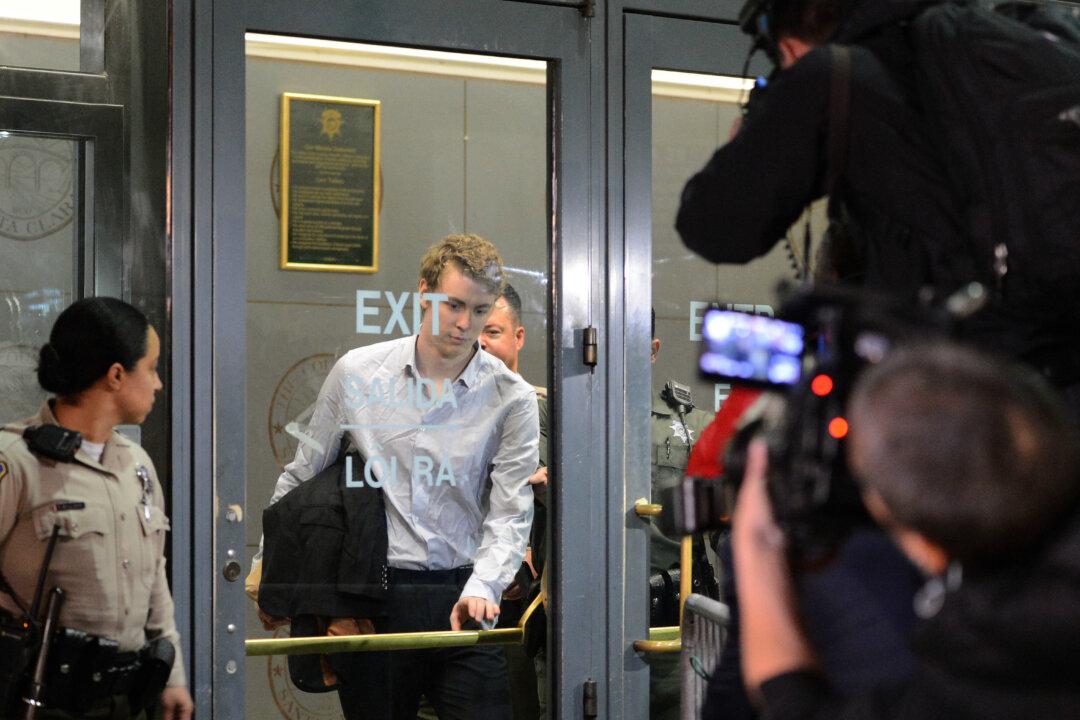SACRAMENTO, Calif.—A November ballot measure backed by Gov. Jerry Brown would allow earlier parole for thousands of California inmates, but critics say it could result in the very situation that led to public outrage in the case of former Stanford University swimmer Brock Turner.
The proposal is aimed at controlling overcrowding in state prisons and reining in costs, and is limited to nonviolent offenders. But in California, “nonviolent” is broadly defined.
It applies to certain rapes and sexual assaults, such as Turner’s conviction, along with vehicular and involuntary manslaughter, assault with a deadly weapon, domestic violence, exploding a bomb with intent to injure and other crimes.
Because of that, the ballot measure could mean less time in prison for people like Turner, prosecutors say. The one-time Olympic hopeful swimmer was released Friday after completing half of a six-month jail sentence for sexually assaulting an unconscious woman behind a trash bin near a fraternity house hosting a party.
Many already were upset that the law allowed him to avoid hard time.
But under Brown’s initiative, Turner would have been eligible for earlier parole consideration even if he had been sentenced to prison, said Ventura County District Attorney Greg Totten, speaking on behalf of the California District Attorneys Association, which opposes the Democratic governor’s plan.
“It’s being represented as something that applies only to nonviolent offenders, and really nothing could be further from the truth,” Totten said.
Supporters say the ballot measure promotes rehabilitation programs and allows corrections officials to decide who gets early parole and who stays behind bars.
Turner’s brief jail term sparked an outcry from numerous politicians, sexual assault survivors and others who are now seeking to recall Santa Clara County Superior Court Judge Aaron Persky.
“I think that this really raises the same concern that’s at the heart of the recall campaign, which is how the legal system treats sexual assault and violence against women,” said recall campaign chairwoman Michele Dauber, a Stanford University law professor who is friends with the woman Turner assaulted. “Treating any kind of sexual assault of an unconscious person as a nonviolent offense, that’s an injustice to women everywhere.”
Turner originally was charged with raping an intoxicated or unconscious person, which also is considered a nonviolent crime because, according to California law, it does not involve force.
State law considers 23 crimes to be violent, including murder and kidnapping. But Dan Newman, a spokesman for the campaign in favor of the ballot measure, called the list “merely a starting point.”
Under Proposition 57, the state corrections department could administratively rule out registered sex offenders like Turner for early release, and parole officials could reject anyone with a dangerous history, Newman said. He noted the violent crimes list includes any felony in which a gun is used or that causes great bodily injury.
Other crimes are considered nonviolent, including solicitation to commit murder, injuring a child, human trafficking involving a minor, criminal threats, hate crimes and shooting at an occupied building, vehicle or aircraft.
Turner faced a minimum two-year prison sentence, and prosecutors sought six years. Persky cited “extraordinary circumstances” in following a probation department recommendation and sentencing him to jail.
The judge is stepping aside from hearing criminal cases. The outcry also prompted legislation sent to Brown last week that would effectively require prison for anyone convicted of raping or sexually assaulting an unconscious or intoxicated person.
National organizations representing lawmakers and law enforcement could not say if other states consider such crimes nonviolent. What constitutes a violent crime varies widely across the nation and even within states, according to the Washington, D.C.-based Justice Policy Institute, a nonprofit group that advocates for reducing incarceration.
Nearly a quarter of California’s 130,000 prison inmates could be eligible for earlier parole if the measure passes, according to the nonpartisan Legislative Analyst’s Office.
The initiative expands on an existing federal court order requiring earlier parole consideration for some offenders convicted of nonviolent and nonsexual crimes. Brown’s administration calculates that the initiative would require immediate parole hearings for 1,300 inmates, about half of whom are likely to be released earlier.
Additionally, the legislative analyst projects that about 7,500 new convicts each year could seek reduced sentences. They could be considered for release about 18 months into a typical two-year sentence.
Newman referred to San Diego County District Attorney Bonnie Dumanis to counter criticism from other prosecutors. But she, too, expressed reservations in a statement, after declining an interview.
“Nothing is perfect, and there are clearly some issues and language that need to be addressed,” Dumanis said.
Dumanis, a Republican and the sole district attorney to publicly support the governor’s plan, praised another part of the ballot measure that would give corrections officials broad authority to award sentencing credits, including to inmates convicted of violent crimes, if they complete rehabilitation programs. The initiative would require judges instead of prosecutors to decide if juveniles should be tried in adult court.
The group Chief Probation Officers of California also supports the measure, as an incentive for inmates who work to improve themselves behind bars.
“I do think overwhelmingly it will be used with what we all agree will be nonviolent offenders,” Loyola Law School professor Laurie Levenson said. “We have to take some risk, otherwise we‘ll never have any reform. The real question here is, ’Are we taking too much risk?'”





